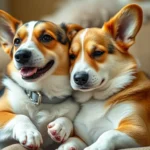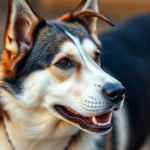
Understanding dog breeds is essential for anyone considering adding a furry companion to their family. Each breed comes with its own unique set of characteristics, temperament, and needs—knowledge that can significantly impact an owner’s experience. One such breed is the Small Munsterlander, a versatile and lively dog known for its friendly demeanor and strong work ethic.
What is the Small Munsterlander?
Origin and History
The Small Munsterlander is a relatively lesser-known breed that hails from Germany. Its origins date back to the 19th century, where it was developed primarily for hunting purpose. The breed was created by crossing various types of spaniels and pointers, resulting in a dog that is adept at both retrieving and pointing game. Their versatility made them popular among hunters, which remains true today.
Historically, the breed was utilized for hunting in diverse terrains, showcasing its adaptability and intelligence. The Small Munsterlander gained recognition in various hunting circles and has been celebrated for its ability to work in the field as well as its affectionate nature as a family companion.
Physical Characteristics
The Small Munsterlander is a medium-sized dog, typically weighing between 35 to 65 pounds and standing about 18 to 21 inches tall at the shoulder. They possess a well-proportioned body that reflects their athletic capabilities.
Their coat is one of their most distinctive features, characterized by a medium-length, wavy, or straight outer layer with a soft undercoat. Common colors include liver and white, often with various patterns and markings. They have long, drooping ears that frame their expressive face, along with a sturdy, feathered tail that adds to their overall charm.
Temperament and Behavior
General Temperament
The Small Munsterlander is known for its friendly and sociable personality. They are generally good-natured and enjoy being around people, making them excellent family pets. This breed is known for its loyalty and affection towards its owners, often forming strong bonds with them.
They are typically good with children and can adapt well to living with other pets, particularly if socialized early. Their playful nature means they thrive on interaction and enjoy being part of family activities.
Energy Levels and Activity Needs
With their rich hunting background, Small Munsterlanders have high energy levels and require regular exercise to keep them happy and healthy. Daily walks, runs, or play sessions are essential, as they thrive in active environments. Engaging them in games like fetch or frisbee can help satisfy their exercise needs.
Training and Obedience
Training a Small Munsterlander is generally a rewarding experience, as they are intelligent and eager to please. Positive reinforcement techniques work best for this breed, making training sessions enjoyable for both the dog and the owner. Early socialization and training are crucial to help them develop into well-rounded adults.
These dogs respond well to consistent commands and can learn various tricks and tasks, making them suitable for various canine sports and activities.
Health Considerations
Common Health Issues
Like any other breed, Small Munsterlanders are prone to certain health issues. Common genetic predispositions include hip dysplasia, which can lead to arthritis and mobility problems, and various eye conditions, such as cataracts. Regular veterinary check-ups and responsible breeding practices can help mitigate these risks.
Lifespan and Care
The average lifespan of a Small Munsterlander ranges from 12 to 14 years, which is typical for medium-sized breeds. Routine veterinary care, a balanced diet, and regular exercise are essential to ensuring a long and healthy life for this breed.
Living with a Small Munsterlander
Ideal Living Conditions
Small Munsterlanders are adaptable dogs that can thrive in various living situations, but they do best in homes with ample space to run and play. While they can live comfortably in apartments, access to nearby parks or open areas is essential for their exercise needs.
They are well-suited for active families, singles, or seniors who can provide them with the attention and engagement they require. Their friendly nature makes them great companions for children and other pets, provided they are socialized properly.
Grooming Needs
Maintaining the coat of a Small Munsterlander requires regular grooming due to its medium-length fur. Brushing a few times a week will help minimize shedding and keep the coat healthy. Bathing should be done as needed, usually every few months, to maintain cleanliness.
In addition to coat maintenance, don’t forget regular grooming of nails and dental care. Keeping their nails trimmed and teeth clean contributes to their overall health and well-being.
Activities and Engagement
Exercise Routines
To keep a Small Munsterlander physically and mentally stimulated, daily exercise is crucial. Aim for at least an hour of vigorous activity each day, which could include walking, running, or playing fetch.
Mental stimulation is just as important as physical exercise. Engaging them in puzzle toys or training games can help keep their minds sharp and prevent boredom-related behaviors.
Suitable Activities
Given their background as hunting dogs, Small Munsterlanders excel in activities such as hunting and field trials. They also enjoy participating in various canine sports, including agility, obedience, and tracking competitions.
These activities not only provide them with physical exercise but also strengthen the bond between the dog and the owner.
Small Munsterlander vs. Other Breeds
Comparison with Similar Breeds
When comparing the Small Munsterlander to similar breeds, such as the German Shorthaired Pointer and the English Springer Spaniel, several differences become apparent. While all these breeds share hunting backgrounds, the Small Munsterlander is particularly known for its gentle temperament and affectionate nature.
Their adaptability makes them a unique choice for families looking for a friendly companion that can also engage in outdoor activities. Unlike some other hunting breeds that may have a more intense drive, Small Munsterlanders often balance their work ethic with a laid-back demeanor at home.
Breed Suitability for Different Owners
The Small Munsterlander is best suited for active individuals or families who can provide the necessary exercise and engagement. While they can adapt to different lifestyles, they thrive in environments where they can be part of family activities.
First-time dog owners should consider their energy levels and training needs, as this breed requires consistent attention and socialization. Those who can commit to these needs will find a loyal and loving companion in the Small Munsterlander.
Adoption and Purchase
Where to Find a Small Munsterlander
For those interested in bringing a Small Munsterlander into their homes, it’s vital to find a reputable source. Responsible breeders will provide health clearances for the puppy’s parents and ensure that the dogs are socialized from a young age.
Rescue organizations can also be a valuable resource for finding a Small Munsterlander in need of a loving home. Adopting can be a fulfilling way to provide a dog with a second chance while experiencing the joy of companionship.
Cost of Ownership
The initial cost of purchasing or adopting a Small Munsterlander can vary widely depending on the source. Breeders may charge anywhere from $800 to $2,000 for a puppy, while adoption fees can range from $50 to $300.
Long-term care costs, including food, grooming, training, and veterinary care, should also be considered. An average annual cost might fall between $1,000 to $2,000, depending on the dog’s needs and health.
Conclusion
The Small Munsterlander is a charming and versatile breed that makes an excellent companion for active individuals and families. With its friendly demeanor, intelligence, and adaptability, this breed is not only suited for hunting but also thrives as a beloved family pet.
When considering adding a dog to your life, it’s essential to evaluate your lifestyle and ensure a good match with the breed’s characteristics. The Small Munsterlander could be the perfect fit for those who can provide the exercise, training, and companionship it desires.









